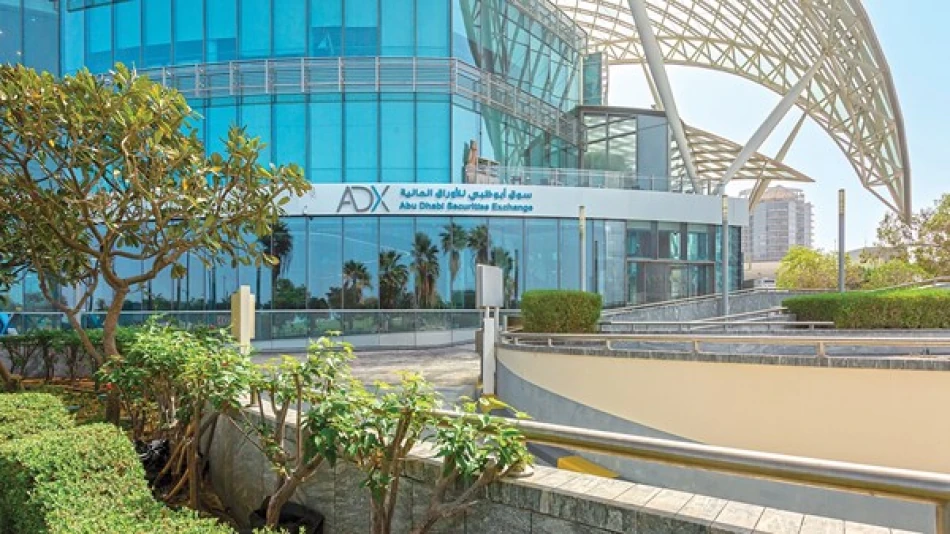
UAE Stock Markets Soar: Gains Reach AED 13 Billion
UAE Stock Markets Surge AED 13 Billion as Banking Giants Lead Rally
The UAE's stock markets delivered a robust performance yesterday, with combined market capitalization gains exceeding AED 13 billion as both Abu Dhabi and Dubai exchanges closed in positive territory. The rally, driven by strong banking sector performance and sustained institutional buying, signals growing investor confidence in the Emirates' economic fundamentals despite global market uncertainties.
Abu Dhabi Securities Exchange Powers Ahead
The Abu Dhabi Securities Exchange (ADX) general index climbed 0.31% to close at 10,331.2 points, adding AED 5 billion to market capitalization. Trading activity reached AED 868.47 million across more than 227.45 million shares through 18,488 transactions.
Market breadth favored buyers, with 43 companies advancing against 30 declining stocks, while 46 remained unchanged. This positive momentum reflects the exchange's growing appeal to both domestic and international investors following recent regulatory reforms and increased foreign ownership limits.
Banking Sector Leads the Charge
First Abu Dhabi Bank (FAB) emerged as a standout performer, surging 2% to close at AED 17.94. The bank's strong showing comes amid expectations of continued interest rate benefits and robust lending growth in the UAE's expanding economy. FAB's performance is particularly significant given its status as the Middle East's largest bank by assets.
Al Dar Properties also contributed to the gains, rising 0.31% to AED 9.57, reflecting continued strength in the UAE's red-hot real estate sector.
Dubai Financial Market Outperforms
Dubai Financial Market (DFM) delivered an even stronger performance, with its general index jumping 0.66% to 6,166.38 points, contributing approximately AED 8 billion to overall market gains. The exchange saw 37 companies advance while only 10 declined.
Total trading value reached AED 484.66 million through 161.113 million shares across 11,952 transactions. Emaar Properties dominated trading activity with AED 100 million in transactions, underscoring investor appetite for Dubai's flagship real estate developer as the emirate's property market continues its remarkable recovery.
Foreign Investment Flows Tell Two Stories
The investment patterns revealed interesting divergences between the two markets. In Abu Dhabi, foreign investors were net buyers to the tune of AED 65 million, with purchases of AED 274.69 million exceeding sales of AED 218.6 million. This suggests international confidence in the capital's blue-chip heavy exchange.
Conversely, Dubai saw net foreign selling of AED 25.51 million, with sales of AED 245.45 million outpacing purchases of AED 219.94 million. However, this shouldn't be viewed negatively—it likely reflects profit-taking after Dubai's remarkable run-up over the past year.
Institutional Money Backs the Rally
Financial institutions demonstrated strong conviction across both markets. In Abu Dhabi, institutional net buying reached AED 51.42 million, while Dubai institutions added AED 9 million in net purchases. This institutional support provides a solid foundation for sustained market strength.
Market Outlook: Riding the Gulf Investment Wave
Yesterday's performance reinforces the UAE's position as the Gulf's premier financial hub. With total market capitalization now exceeding AED 3.15 trillion in Abu Dhabi alone, the UAE exchanges are attracting increasing attention from global fund managers seeking exposure to the region's economic transformation.
The relatively calm trading volumes—AED 1.35 billion across both exchanges—suggest this rally has room to run without overheating. As regional economies benefit from higher oil prices and ambitious diversification programs, UAE markets appear well-positioned to continue their upward trajectory.
For international investors, these gains highlight the UAE's emergence as a stable, liquid alternative to more volatile emerging markets, particularly as the country continues implementing investor-friendly reforms and expanding its capital markets infrastructure.
Most Viewed News

 Layla Al Mansoori
Layla Al Mansoori






